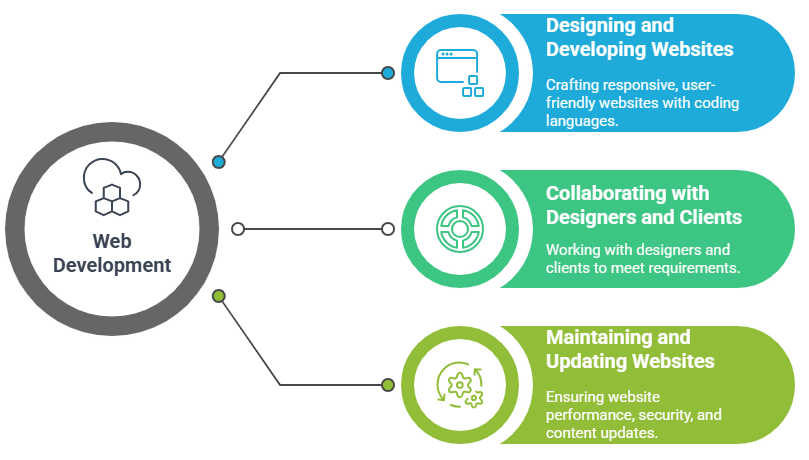
- Web Developer Job Overview
- Web Developer Key Responsibilities
- Technical Skills for Web Developers
- Web Developer Educational Requirements
- Experience Needed for Web Developer
- Soft Skills for Web Developers
- Web Developer Work Environment
- Web Developer Salary and Benefits
Web Developer Job Overview
A Web Developer is responsible for designing, coding, and maintaining websites and web applications to ensure they are visually appealing, user-friendly, and functional. They work closely with clients, project managers, and designers to understand requirements and translate them into interactive and responsive web solutions. Web developers typically specialize in front-end development (dealing with user-facing aspects of websites using languages like HTML, CSS, and JavaScript) or back-end development (focused on server-side logic, databases, and APIs using languages like PHP, Ruby, Python, or Node.js). Full-stack developers handle both aspects. Their tasks include debugging code, ensuring website security, optimizing site performance, and keeping up with industry trends to implement the latest technologies. Enrolling in Web Developer Certification Courses can help professionals build and validate these skills, staying competitive in the fast-evolving tech landscape. Web developers must have a strong understanding of web frameworks, content management systems (CMS), and version control systems like Git. In addition to technical skills, they need problem-solving abilities, attention to detail, and effective communication skills for collaborating with team members and stakeholders. With the constant evolution of the web, web developers need to continuously learn new tools, languages, and techniques to build efficient, scalable, and future-proof websites that meet the needs of clients and end-users.
Are You Interested in Learning More About Web Developer Certification? Sign Up For Our Web Developer Certification Courses Today!
Web Developer Key Responsibilities
- Designing and Developing Websites: Build responsive, user-friendly websites and web applications using coding languages like HTML, CSS, JavaScript, and various frameworks.
- Collaborating with Designers and Clients:Work closely with designers, project managers, and clients to understand requirements and translate them into functional, interactive web features. For mobile app development, understanding React Native Firebase features explained can be crucial, as Firebase provides powerful tools for real-time data syncing, user authentication, and backend management.
- Maintaining and Updating Websites: Regularly update website content, troubleshoot technical issues, and improve the site’s performance and security.
Web developers play a crucial role in building and maintaining websites and applications. They are responsible for ensuring that the final product is both visually appealing and fully functional, meeting the needs of clients and users. Their responsibilities span from front-end to back-end development, ensuring a seamless user experience. Below are the key responsibilities of a web developer:

- Optimizing Website Performance: Ensure that websites load quickly, are mobile-friendly, and provide smooth user experiences by optimizing code, images, and server-side performance.
- Integrating APIs and Databases: Implement back-end logic, integrate third-party APIs, and manage databases to support dynamic and interactive features of web applications.
- Ensuring Web Security: Identify vulnerabilities, implement security measures, and follow best practices to safeguard websites and user data from cyber threats.
- Bachelor’s Degree in Computer Science or Related Field: A formal degree in computer science, information technology, or a related field offers a solid foundation in programming, algorithms, and data structures, which are essential for web development.
- Web Development Bootcamps: Intensive bootcamp programs offer practical, hands-on training in web development in a shorter period. They often focus on key web technologies and provide industry-relevant skills. Graduates of such programs can also look forward to competitive Software Engineer Salary, especially as they gain experience and specialize in high-demand technologies.
- Self-Taught via Online Resources: Many web developers are self-taught, using online tutorials, courses, and coding platforms such as Codecademy, freeCodeCamp, or Udemy to learn HTML, CSS, JavaScript, and other technologies.
- Certifications in Web Development: Earning certifications from recognized institutions (e.g., Google, Microsoft) can validate a developer’s expertise in specific tools and technologies, boosting credibility in the job market.
- Familiarity with Development Tools and Frameworks: A solid understanding of development environments, version control systems (like Git), and frameworks (such as React or Angular) is important for modern web development.
- Portfolio of Web Development Projects: Building a strong portfolio of personal or freelance web projects is often more important than formal education, as it showcases practical skills and problem-solving abilities to potential employers.
- Problem-Solving: Web developers must have strong problem-solving abilities to debug issues, troubleshoot errors, and create efficient solutions to technical challenges.
- Communication Skills: Clear communication is essential when explaining technical concepts to non-technical stakeholders, working with team members, or gathering requirements from clients.
- Attention to Detail: Web development often involves complex code and designs. A keen eye for detail helps developers catch errors, ensure quality, and deliver polished results. For example, Creating Linear Gradient in React Native requires attention to design elements, ensuring smooth transitions and visually appealing interfaces in mobile applications.
- Time Management: Meeting deadlines and managing multiple tasks is vital for developers. Good time management helps ensure that projects stay on track and are completed efficiently.
- Adaptability: The web development field is constantly evolving. Developers need to be open to learning new technologies and adapting to changes in tools, languages, or frameworks.
- Collaboration and Teamwork: Web development is rarely a solo endeavor. Developers must be able to collaborate effectively with other developers, designers, and stakeholders to create cohesive and functional web solutions.
Technical Skills for Web Developers
Web developers need a diverse set of technical skills to build, maintain, and optimize websites and applications. A strong foundation in HTML and CSS is essential for structuring content and styling websites. These markup and styling languages allow developers to create visually appealing, well-organized web pages. JavaScript is another critical skill, enabling developers to add interactivity and dynamic features to websites, such as form validation, animations, and real-time updates. Version control using Git is also a must-have, allowing developers to manage and track changes to their code, collaborate with teams, and streamline the development process. Additionally, Salary for Full Stack Developer is often higher due to the wide range of skills required, including both front-end and back-end expertise. Knowledge of responsive design is essential to ensure websites perform well across various devices, and frameworks like Bootstrap can help create mobile-friendly websites quickly. On the back-end side, developers must be proficient in server-side programming languages like PHP, Python, Node.js, or Ruby, as these are used to handle data, server logic, and integration with databases. Database management skills are also crucial, with expertise in systems like MySQL, MongoDB, or PostgreSQL allowing developers to store and retrieve data effectively. Finally, familiarity with web security best practices ensures that websites are protected from vulnerabilities and cyber threats.
Excited to Obtaining Your web developer Certificate? View The web developer course Offered By ACTE Right Now!
Web Developer Educational Requirements
While there isn’t a one-size-fits-all path to becoming a web developer, certain educational qualifications can significantly enhance a developer’s skills and career prospects. These educational requirements provide a strong foundation in both the technical and problem-solving aspects of web development. Below are the typical educational requirements for web developers:
Interested in Pursuing web developer certification Program? Enroll For Web developer course Today!
Experience Needed for Web Developer
To succeed as a web developer, a combination of practical experience and technical expertise is crucial. Entry-level positions may require limited hands-on experience, but candidates should possess a solid understanding of basic web development concepts, including HTML, CSS, and JavaScript. As developers gain experience, they are expected to have a deeper knowledge of front-end and back-end technologies, such as React, Angular, Node.js, and database management systems like MySQL or MongoDB. Completing Web Developer Certification Courses can help solidify this expertise and demonstrate proficiency to employers, setting developers apart in a competitive job market. In addition, experience working with version control systems like Git and knowledge of frameworks and content management systems (CMS) are valuable assets. For more advanced roles, web developers should demonstrate the ability to design and implement complex websites, troubleshoot bugs, optimize site performance, and ensure security. They should also have experience collaborating with cross-functional teams, including designers, project managers, and clients, to deliver tailored web solutions. Typically, 2-5 years of experience is required for mid-level positions, while senior developers usually need 5+ years, along with a strong portfolio showcasing their work on live projects. Continuous learning and the ability to adapt to new technologies are essential in this fast-evolving field, ensuring that web developers stay current and proficient throughout their careers.

Soft Skills for Web Developers
In addition to technical expertise, soft skills are essential for web developers to work effectively in a team environment, communicate with clients, and solve complex problems. These skills help developers collaborate seamlessly, handle challenges, and ensure that projects meet expectations. Below are key soft skills that are crucial for web developers:
Web Developer Work Environment
Web developers typically work in dynamic, tech-driven environments that can range from corporate offices and digital agencies to startups and freelance settings. The nature of their work is largely computer-based, involving long hours at a desk coding, testing, and debugging websites or applications.Many web developers enjoy the flexibility of remote work or hybrid schedules, thanks to the digital nature of their tasks. A key tool for backend development in JavaScript is What is Express JavaScript, a framework that simplifies building web applications and APIs by providing robust features for handling requests, routing, and middleware. The work environment often involves collaboration with other professionals, such as UI/UX designers, project managers, content creators, and other developers, requiring strong communication and teamwork. Developers may work independently on smaller projects or as part of a larger development team on complex applications. Fast-paced and deadline-oriented, the environment can sometimes be high-pressure, especially when launching new features or fixing urgent bugs. However, it also fosters creativity and problem-solving, with opportunities to continually learn and apply new technologies. Most workplaces provide access to the latest tools, platforms, and version control systems to support efficient development workflows. Whether in a formal office or a home workspace, web developers thrive in settings that encourage focus, innovation, and ongoing skill development to keep up with the evolving demands of web technologies and user expectations.
Web Developer Salary and Benefits
Web developers enjoy competitive salaries and a wide range of benefits, reflecting the high demand for skilled professionals in the tech industry. Salaries can vary based on experience, location, education, and the specific technologies a developer specializes in.Entry-level web developers typically earn a solid starting salary, while mid-level and senior developers can command significantly higher pay, especially those proficient in full-stack development or in-demand frameworks like React, Angular, or Node.js. Completing Web Designing Training can also boost a developer’s salary potential by expanding their skill set and enhancing their design expertise. In the United States, for example, the average annual salary for a web developer ranges from $60,000 to over $100,000, with freelance developers and contractors sometimes earning more depending on their workload and expertise. In addition to salary, many employers offer attractive benefits packages, including health insurance, paid time off, retirement plans, performance bonuses, and stock options in tech startups. Remote work opportunities, flexible schedules, professional development support, and access to the latest tools and technologies are also common perks in the industry. These benefits contribute to high job satisfaction and make web development a rewarding career path for those with strong technical skills and a passion for continuous learning and innovation in the digital space.

